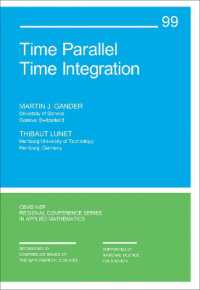- ホーム
- > 洋書
- > 英文書
- > Literary Criticism
Full Description
How Russian Literature Became Great explores the cultural and political role of a modern national literature, orchestrated in a Slavonic key but resonating far beyond Russia's borders.
Rolf Hellebust investigates a range of literary tendencies, philosophies, and theories from antiquity to the present: Roman jurisprudence to German Romanticism, French Enlightenment to Czech Structuralism, Herder to Hobsbawm, Samuel Johnson to Sainte-Beuve, and so on. Besides the usual Russian suspects from Pushkin to Chekhov, Hellebust includes European writers: Byron and Shelley, Goethe and Schiller, Chateaubriand and Baudelaire, Dante, Mickiewicz, and more.
As elsewhere, writing in Russia advertises itself via a canon of literary monuments constituting an atemporal "ideal order among themselves" (T.S. Eliot). And yet this is a tradition that could only have been born at a specific moment in the golden nineteenth-century age of historiography and nation-building. The Russian example reveals the contradictions between immutability and innovation, universality and specificity at the heart of modern conceptions of tradition from Sainte-Beuve through Eliot and down to the present day.
The conditions of its era of formation—the prominence of the crucial literary-historical question of the writer's social function, and the equation of literature with national identity—make the Russian classical tradition the epitome of a unified cultural text, with a complex narrative in which competing stories of progress and decline unfold through the symbolic biographical encounters of the authors who constitute its members. How Russian Literature Became Great thus offers a new paradigm for understanding the paradoxes of modern tradition.







